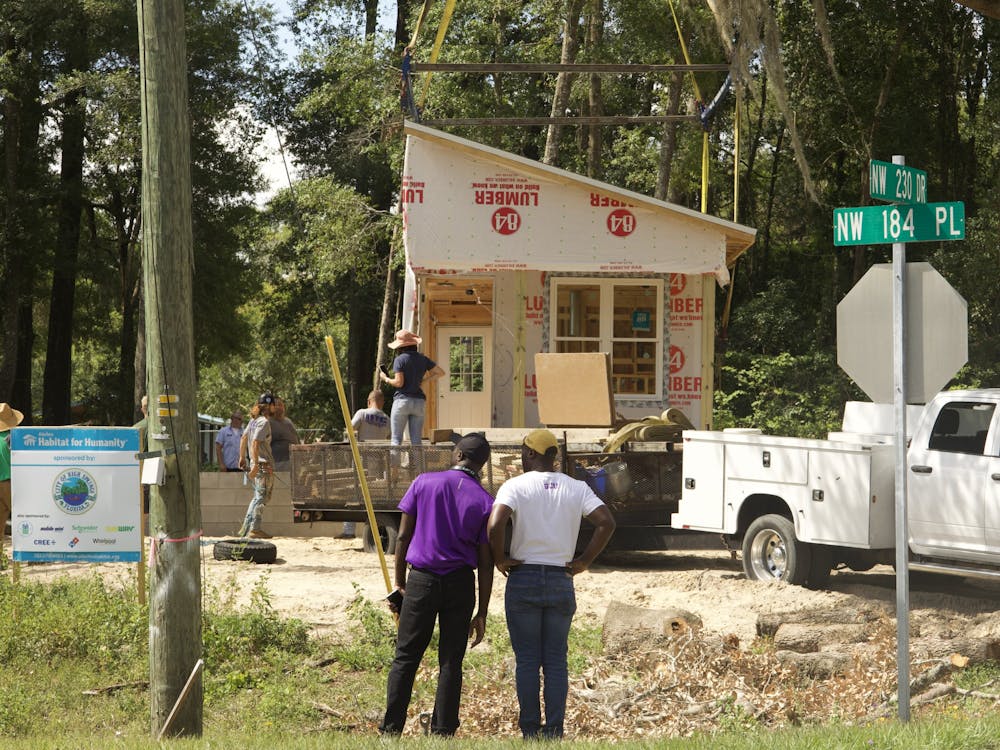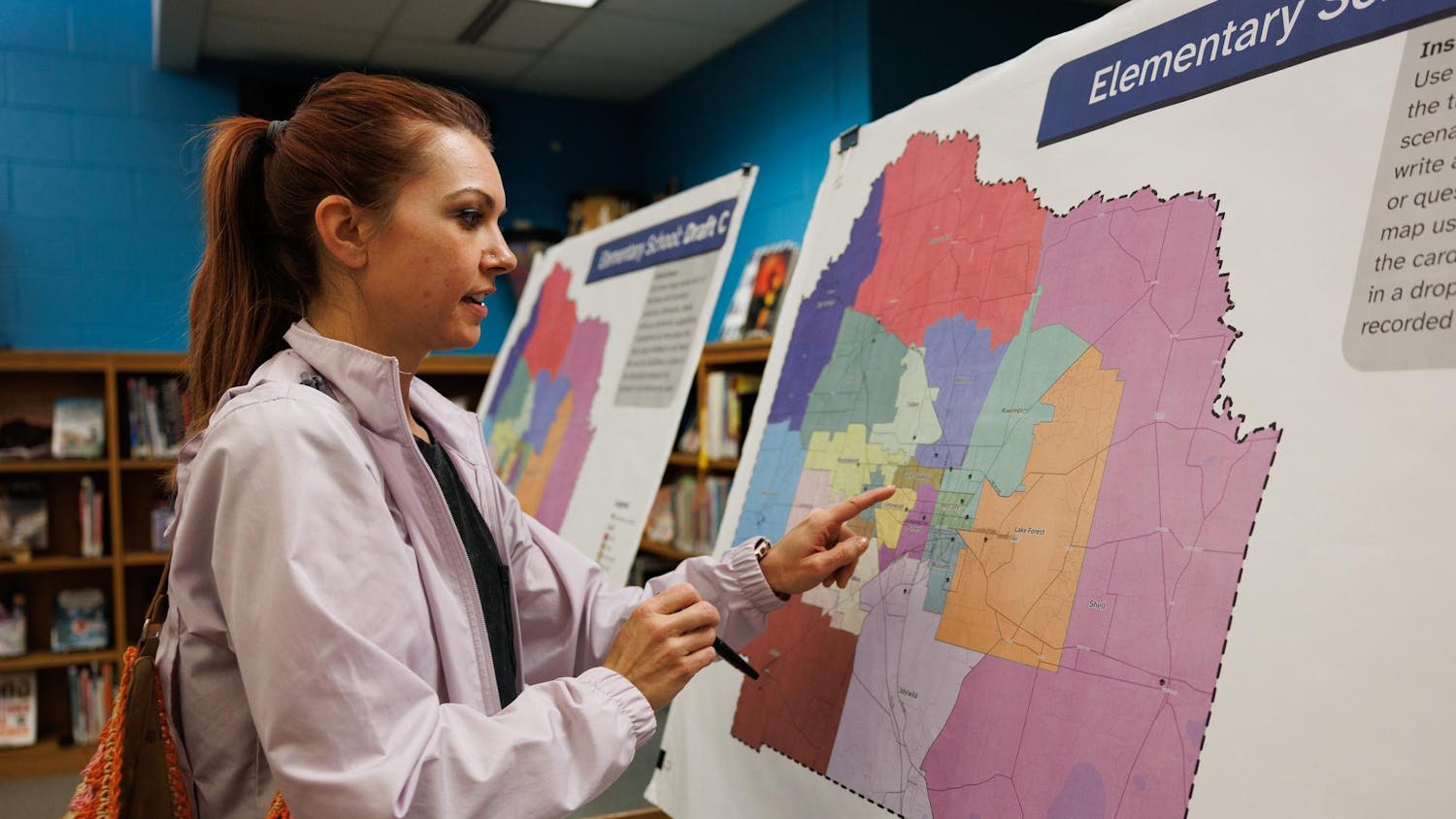When Tina Days, a 44-year-old mother of four, drives through Gainesville to deliver DoorDash orders, she is always taken aback by the increasing number of lavish apartment complexes cornering UF's campus.
Days owns a home in Highland Court Manor, a neighborhood in East Gainesville. She decided she wanted to sell her home and rent an apartment in 2019 due to the stress of ongoing maintenance issues.
She couldn’t find a rent price in her area below her monthly mortgage payment after a month of searching.
"It was so ridiculous," she said. "I just gave up. There's no [affordable] family housing."
Four years later, local housing costs have only increased.
The median price of a home in Gainesville is $272,000, a 5.2 percent increase from the previous year. Gainesville’s median apartment rent sits at $1,692 as of June 2023, a roughly 8 percent increase from June 2022 and nearly 30 percent increase from July 2020.
The UF Shimberg Center for Housing Studies’ most recent brief reported 36 percent of Alachua County low-income renters put more than 40 percent of their income toward housing.
This follows the statewide trend of rising housing costs. Florida gained roughly 600,000 units with rents above $1,000 and lost about 277,000 units renting for $1,000 or less between 2012 and 2021, according to the brief.
Two recently enacted laws — Senate Bill 102 and House Bill 1417 — seek to address Florida’s ongoing affordable housing crisis by investing in state housing programs and rescinding local tenant regulations.
Local city officials, researchers, nonprofit members and residents have mixed feelings about how the laws will impact Gainesville’s affordable housing initiatives and policies.
SB 102, also known as the Live Local Act, aims to support the development of affordable housing across the state.
The law preempts local governments’ zoning, density and height requirements for affordable housing developments in commercial or mixed-use areas, expands tax incentives for developers, bars local governments from imposing rent control policies and allocates $711 million to state affordable housing programs.
Days hopes the Live Local Act promotes the construction of affordable, single-family housing near her neighborhood. Most of the lowest-priced homes in her area are not affordable for lower-income families, she said.
“What do you define as affordable housing, is it more than $150,000?” she said. “That's not affordable.”
Gainesville city officials have made contradictory decisions concerning affordable housing over the past year.
In February, the city announced it would put $7.2 million toward affordable housing grants. However, the Gainesville City Commission voted to bring back exclusionary zoning policies in April, making it more difficult for developers to build affordable housing in certain neighborhoods.
Anne Ray, the Shimberg Center’s manager of the Florida Housing Data Clearinghouse, supports the Live Local Act’s provisions that fund state affordable housing programs as working wages cannot compete with rising housing costs.
Whether or not Gainesville benefits from the Live Local Act lies in the hands of city and county officials, Ray said.
“They’re gonna be in competition with each other for limited state resources, so the city and county really need to jump on this,” she said.
The bill expands and protects funding for programs like SAIL, which provides low-interest loans to developers, and SHIP, which incentivizes local governments that enter partnerships to develop affordable housing, she said.
Vishnu Malhotra is a 19-year-old lead at Gainesville Is For People, a local chapter of the national nonprofit dedicated to housing affordability YIMBY Action. The Live Local Act is a step in the right direction, he said.
“This is a positive piece of legislation,” he said. “It finally shows Florida is at least recognizing that we have one of the worst affordable housing crises in the nation.”
A major achievement within the bill is the loosening of certain requirements that previously hindered developers from building affordable housing in mixed-use, industrial and commercial areas, he said.
While opposers of the Live Local Act criticize its provision banning local governments from imposing rent control, Malhotra believes rent control policies have historically yielded unfavorable outcomes.
“It tends to discourage development of new housing units and we know that everywhere across the country there’s a massive shortage,” he said.
Malhotra hopes the expanded funding provided through Live Local inspires city officials to bring more affordable housing developments to West Gainesville. The majority of existing affordable developments are on the Eastside, he said.
“We have a long and checkered history of putting affordable housing in neighborhoods that are more often than not populated by people of color,” he said. “Concentrating affordable housing in certain regions can lead to worsened poverty, less development and more crime.”
HB 1417 strips control of the tenant-landlord relationship away from local governments and transfers it to the state, forcing counties and municipalities to repeal their tenant bill of rights ordinances. The law also allows landlords to charge tenants a monthly, non-refundable fee rather than requiring a security deposit.
Alex Hood is a 21-year-old assistant coordinator with the Alachua County Labor Coalition and a political science student at Santa Fe College. He walks dogs and house-sits at times to make his monthly rent payments.
“When I pay rent every month there's no money in my bank account left,” he said.
Hood supports the development of new affordable housing but worries the state takeover of the tenant-landlord relationship will spark discrimination from landlords against tenants.
“It’s important that [the city is] able to step in when developers and landlords aren’t being fair to their tenants,” he said. “Whether that's discriminating on the basis of their gender or their lawful source of income.”
The Gainesville City Commission discussed both bills at a general policy meeting July 27. Although the commission praised the funding of state affordable housing programs, HB 1417 and the preemptive provisions of the Live Local Act cast a shadow over the discussion.
The commission voted to begin drafting an ordinance to repeal Gainesville's Rental Housing Ordinance, which was introduced in 2020 and includes a tenant bill of rights.
City Commissioner Reina Saco, who helped establish the ordinance, was hurt to see her years of work be struck down by the state, she said. Tenants saw the ordinance as a source of relief as they could seek help from the city with landlord conflicts.
Moving forward, the city commission will focus on land use and zoning policies to support the development of affordable housing.
“As a commission, we need to acknowledge the very frank reality of what is no longer accessible to us and look at the tools that are in the box,” she said.
Contact Amanda at afriedman@alligator.org. Follow her on Twitter @amandasfriedman.
Amanda Friedman is a senior journalism major and the Enterprise Editor at The Alligator. She previously wrote for the Avenue, Metro and University desks. When she isn't reporting, she loves watching coming-of-age films and listening to Ariana Grande.






